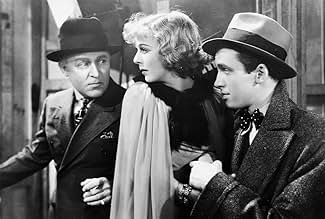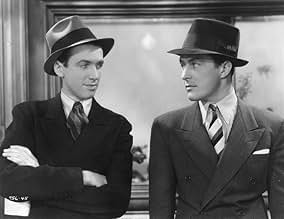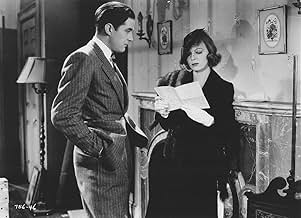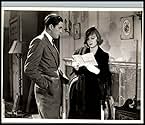अपनी भाषा में प्लॉट जोड़ेंA young married couple's relationship becomes strained when he is assigned overseas as a foreign correspondent and she becomes a major stage star.A young married couple's relationship becomes strained when he is assigned overseas as a foreign correspondent and she becomes a major stage star.A young married couple's relationship becomes strained when he is assigned overseas as a foreign correspondent and she becomes a major stage star.
- पुरस्कार
- कुल 3 जीत
Ray Milland
- Tommy Abbott
- (as Raymond Milland)
Ronnie Cosby
- Kit
- (as Ronald Cosbey)
Arthur Aylesworth
- Secretary
- (बिना क्रेडिट के)
King Baggot
- Character man
- (बिना क्रेडिट के)
Tommy Bond
- Pesky Kid
- (बिना क्रेडिट के)
Harry C. Bradley
- Desk Clerk
- (बिना क्रेडिट के)
Tyler Brooke
- Author
- (बिना क्रेडिट के)
Daisy Bufford
- Maid
- (बिना क्रेडिट के)
Jack Cheatham
- Taxi Driver
- (बिना क्रेडिट के)
Jack Daley
- Conductor
- (बिना क्रेडिट के)
John Dilson
- Stage Manager
- (बिना क्रेडिट के)
Charles Fallon
- Prof. Dindet
- (बिना क्रेडिट के)
फ़ीचर्ड समीक्षाएं
Jimmy Stewart's first big role. This is not a romance we are used to with a happily ever after ending. Not even close. Maybe that would make it interesting and worthwhile but meh, I'm not all that impressed with this. You can see the immense talent in the young 27 year old Jimmy but he is still very much coming into his own here. Not the best vehicle for him considering I would never guess his character to be a man under at least 30. Quite a mature role for such a youngster to Hollywood. Still an okay, quick film that isn't his best but is from such a great era that it's hard to say it's bad!
5.7 / 10 stars
--Zoooma, a Kat Pirate Screener
5.7 / 10 stars
--Zoooma, a Kat Pirate Screener
Stewart's first breakout role. The magnetism between Sullavan and Stewart is undeniable in this sophisticated story about a couple whose careers don't quite mesh. Their divergent careers inevitably causes their marriage to be a rocky one with many ups and downs. The plot, although a progressive one ahead of its time, is not an appealing one. I wanted to like this movie, but the plot kept me from it. It fell flat and seemed rushed.
By the time her fifth film was ready to be launched Margaret Sullavan had achieved a position of some clout with her original studio Universal Pictures. She used that clout to get as her leading man, a young player she knew from Broadway as the best friend of her then husband Henry Fonda. Sullavan got Carl Laemmle to get Louis B. Mayer to loan him James Stewart and from Paramount as the second lead she got Ray Milland.
But Stewart was her project and she more than director Edward Griffith got him through Next Time We Love to favorable notices. This was Stewart's highest billing yet, co-starring to Margaret Sullavan and he made the most of it. They did three more films together and in only one of them did either Sullavan or Stewart not die in. They were the king and queen of bittersweet romances back in the day.
Sullavan is highly successful stage star and Stewart is a reporter with ambitions to be an international correspondent. Sullavan might have been better off marrying Ray Milland who is a producer, but something about the shy and stammering Jimmy wins her heart and that would be the first in a long line of female hearts on the screen to feel that way.
Of course being an international correspondent does keep Stewart away a lot and Margaret does not want to give up a successful stage career that's just getting started. Even with the arrival of a baby boy the problems only increase until a really heavy crisis comes on that overwhelms all.
Next Time We Love is an intelligent mature drama that holds up well and I'm surprised has not been remade. I could see a Cate Blanchett or a Gwyneth Paltrow in Sullavan's role with possibly Matthew McConaughey in the Stewart part in a remake today. Somebody in Hollywood take note.
But Stewart was her project and she more than director Edward Griffith got him through Next Time We Love to favorable notices. This was Stewart's highest billing yet, co-starring to Margaret Sullavan and he made the most of it. They did three more films together and in only one of them did either Sullavan or Stewart not die in. They were the king and queen of bittersweet romances back in the day.
Sullavan is highly successful stage star and Stewart is a reporter with ambitions to be an international correspondent. Sullavan might have been better off marrying Ray Milland who is a producer, but something about the shy and stammering Jimmy wins her heart and that would be the first in a long line of female hearts on the screen to feel that way.
Of course being an international correspondent does keep Stewart away a lot and Margaret does not want to give up a successful stage career that's just getting started. Even with the arrival of a baby boy the problems only increase until a really heavy crisis comes on that overwhelms all.
Next Time We Love is an intelligent mature drama that holds up well and I'm surprised has not been remade. I could see a Cate Blanchett or a Gwyneth Paltrow in Sullavan's role with possibly Matthew McConaughey in the Stewart part in a remake today. Somebody in Hollywood take note.
Though in many ways a soapy tearjerker, this movie is one of many 1930s dramas with a surprisingly adult perspective, with sophisticated attitudes towards marriage, infidelity and divorce. It helps that James Stewart and Margaret Sullavan are incredibly well-matched: you're able to sympathize with both partners. All in all, an entertaining melodrama about how clashing careers can strain a marriage, and a remarkably modern look at love versus ambition.
Friendships help when it comes time for actors and actresses to advance their careers. James Stewart had friends at just the right places in his first year working in film. His friendship with actress Margaret Sullivan proved a crucial step to his becoming one of Hollywood's most popular actors when she heavily lobbied her studio for him as a replacement in January 1936's "Next Time We Love." It was the first of four films the two appeared in together.
Stewart had met Sullivan in his first stage acting gig with the University Players in Cape Cod in the summer of 1932. He worked alongside Sullivan and her husband Henry Fonda with the same Massachusetts company. Sullivan's marriage with Fonda didn't last long, but Stewart's friendship with both endured well after the Cape's theatre summer season ended. Stewart moved to New York City with the now-single Fonda as a roommate to find steady employment on Broadway. Meanwhile Sullivan, relocating to Hollywood, always kept in contact with the two after she signed a short contract with Universal Pictures in 1933. Stewart, after spotted by an MGM talent scout, followed her footpath to Tinseltown, and played in a couple of small roles with the studio, including 1936's "Rose Marie." After seeing her co-star bow out of "Next Time We Love," Sullivan twisted Universal's arm to get MGM to loan-out Stewart as his replacement. The studio agreed, and made arrangements to get Stewart his biggest role on the screen yet.
Filming the early scenes for "Next Time We Love" did not go well for Stewart in the eyes of its director Edward Griffith. He started hectoring the young actor, making him nervous and causing him to stumble over his lines. Sullivan, seeing her friend's career flushing down the toilet right before her eyes, spent the following nights coaching Stewart, instructing him to tamper down his unsteady mannerisms and his clipped delivery Of speaking. After a few days, the director could see a huge difference. "It was Margaret Sullivan who made James Stewart a star," Griffith later said. When the actor returned to his contracted studio, MGM talent scout Bill Grady, who had picked out Stewart on the Broadway stage, noticed a new person. "That boy came back from Universal so changed I hardly recognized him."
"Next Time We Love," adapted from Ursula Parrott's 1935 British novel 'Next Time We Live,' involves Stewart as Christopher Tyler, a reporter who is offered a lucrative overseas position he can't refuse. Meanwhile, his wife Cicely (Sullivan)stays home while pursuing a stage career assisted by Stewart's best friend, Tommy Abbott (Raymond Milland), an insider to Broadway's biggest honchos.
It's a newly refreshed Stewart that makes "Next Time We Live" so noteworthy. Film reviewer David Krauss was startled by the transformation of the new star. "Confident, relaxed, and seemingly so attuned to the finer points of film acting, he comes across as the consummate professional and files a deeply sensitive, unaffected performance that previews the gallery of diverse yet natural characterizations he would etch on celluloid over the next half century." Krauss was equally effusive about Sullivan. "Whether warm, loving, noble, headstrong, resentful, recalcitrant, or devastated, Sullavan is always genuine, and the chemistry she creates with Stewart is both comfortable and crackling. It's not surprising the two made four movies together. I only wish they made more."
Stewart had met Sullivan in his first stage acting gig with the University Players in Cape Cod in the summer of 1932. He worked alongside Sullivan and her husband Henry Fonda with the same Massachusetts company. Sullivan's marriage with Fonda didn't last long, but Stewart's friendship with both endured well after the Cape's theatre summer season ended. Stewart moved to New York City with the now-single Fonda as a roommate to find steady employment on Broadway. Meanwhile Sullivan, relocating to Hollywood, always kept in contact with the two after she signed a short contract with Universal Pictures in 1933. Stewart, after spotted by an MGM talent scout, followed her footpath to Tinseltown, and played in a couple of small roles with the studio, including 1936's "Rose Marie." After seeing her co-star bow out of "Next Time We Love," Sullivan twisted Universal's arm to get MGM to loan-out Stewart as his replacement. The studio agreed, and made arrangements to get Stewart his biggest role on the screen yet.
Filming the early scenes for "Next Time We Love" did not go well for Stewart in the eyes of its director Edward Griffith. He started hectoring the young actor, making him nervous and causing him to stumble over his lines. Sullivan, seeing her friend's career flushing down the toilet right before her eyes, spent the following nights coaching Stewart, instructing him to tamper down his unsteady mannerisms and his clipped delivery Of speaking. After a few days, the director could see a huge difference. "It was Margaret Sullivan who made James Stewart a star," Griffith later said. When the actor returned to his contracted studio, MGM talent scout Bill Grady, who had picked out Stewart on the Broadway stage, noticed a new person. "That boy came back from Universal so changed I hardly recognized him."
"Next Time We Love," adapted from Ursula Parrott's 1935 British novel 'Next Time We Live,' involves Stewart as Christopher Tyler, a reporter who is offered a lucrative overseas position he can't refuse. Meanwhile, his wife Cicely (Sullivan)stays home while pursuing a stage career assisted by Stewart's best friend, Tommy Abbott (Raymond Milland), an insider to Broadway's biggest honchos.
It's a newly refreshed Stewart that makes "Next Time We Live" so noteworthy. Film reviewer David Krauss was startled by the transformation of the new star. "Confident, relaxed, and seemingly so attuned to the finer points of film acting, he comes across as the consummate professional and files a deeply sensitive, unaffected performance that previews the gallery of diverse yet natural characterizations he would etch on celluloid over the next half century." Krauss was equally effusive about Sullivan. "Whether warm, loving, noble, headstrong, resentful, recalcitrant, or devastated, Sullavan is always genuine, and the chemistry she creates with Stewart is both comfortable and crackling. It's not surprising the two made four movies together. I only wish they made more."
क्या आपको पता है
- ट्रिविया"Lux Radio Theater" broadcast a 60 minute radio adaptation of the movie on November 7, 1938 with Margaret Sullavan reprising her film role.
- भाव
Frank Carteret: It's amazing! The things people ask of love. They expect it to protect them, keep them from being bored, make them work harder. In fact , they want everything except love.
- इसके अलावा अन्य वर्जनCurrent prints of this film feature the Universal logo created in late 1936, and say "The New Universal Presents". That is because they were made after studio founder Carl Laemmle was ousted from Universal Studios and the takeover of the studio by a new conglomerate. The picture was actually released before Laemmle left. That is why the "The End" credit features an airplane circling the globe, the logo that Universal used while Laemmle was in power.
- कनेक्शनFeatured in Great Performances: James Stewart: A Wonderful Life (1987)
टॉप पसंद
रेटिंग देने के लिए साइन-इन करें और वैयक्तिकृत सुझावों के लिए वॉचलिस्ट करें
- How long is Next Time We Love?Alexa द्वारा संचालित
विवरण
- चलने की अवधि
- 1 घं 27 मि(87 min)
- रंग
- पक्ष अनुपात
- 1.37 : 1
इस पेज में योगदान दें
किसी बदलाव का सुझाव दें या अनुपलब्ध कॉन्टेंट जोड़ें


































